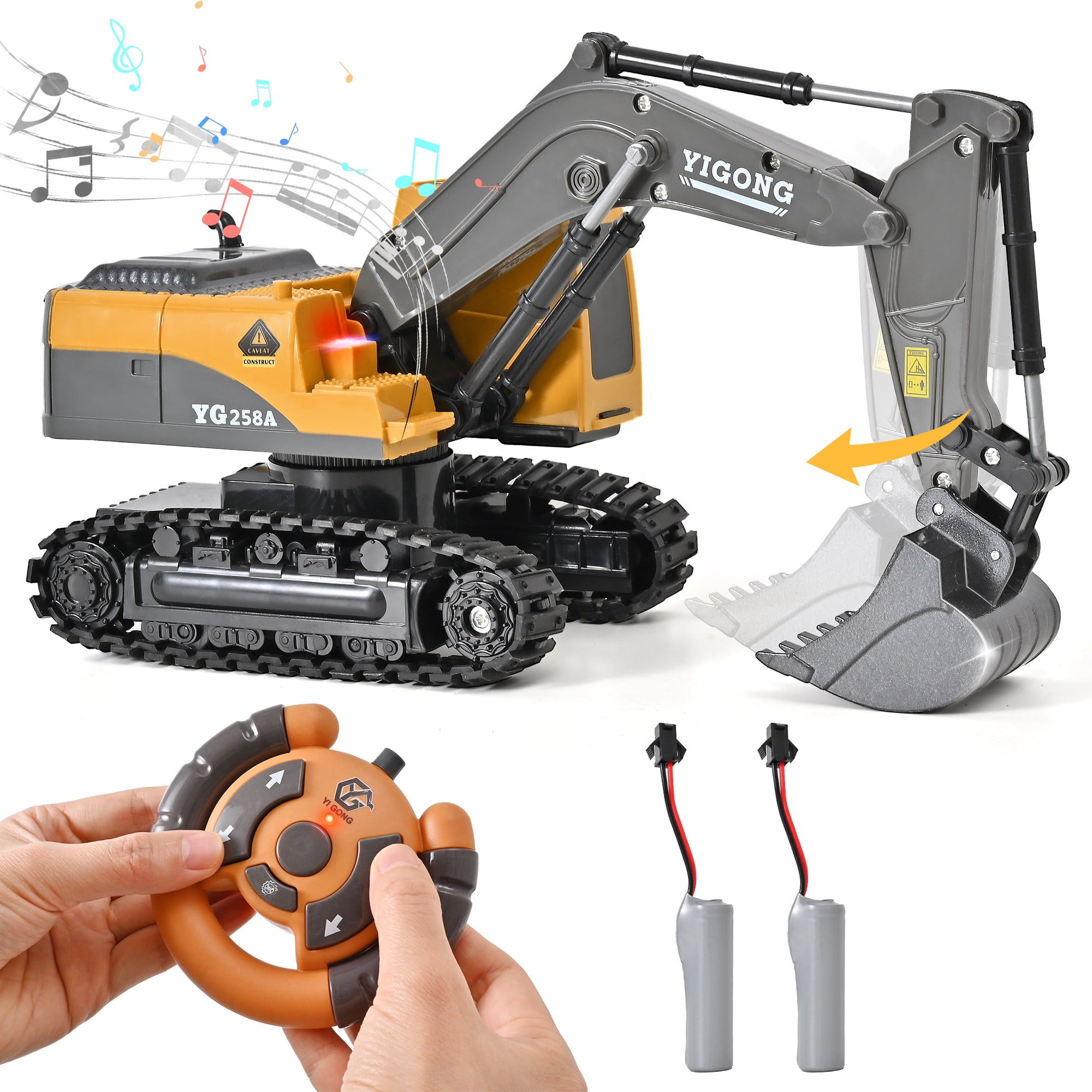Comprehending How Excavator Functions and Its Influence On Performance
Excavators play an important function in construction and mining procedures, relying on a complicated interplay of mechanical and hydraulic systems. Their ability to perform a variety of tasks hinges on both their design and the technology incorporated within. Comprehending these components can substantially affect operational performance and performance. As innovations remain to reshape the market, one should think about exactly how these changes will certainly influence future techniques and performance.
The Essentials of Excavator Mechanics

The Function of Hydraulic Equipments in Excavators
At the heart of excavator operation lies the hydraulic system, which plays a crucial role in powering the machine's motions and features. This system utilizes pressurized hydraulic fluid to transfer energy, enabling various actions such as excavating, moving, and lifting. By utilizing the concepts of hydraulics, excavators can perform tasks with amazing precision and pressure, improving total operational efficiency.The hydraulic system contains key elements, including valves, cylinders, and pumps, which function with each other to regulate the circulation and direction of the fluid. When the operator engages the controls, the hydraulic fluid is guided to certain cyndrical tubes, converting the operator's commands right into physical motion. This device permits responsive and smooth actions, which are crucial in building and construction and excavation settings. double e volvo rc excavator. The performance of the hydraulic system straight impacts the productivity and versatility of the excavator, making it a vital aspect in contemporary excavation processes
Trick Elements of an Excavator
Recognizing the key parts of an excavator is vital for realizing exactly how this effective device runs. An excavator contains several considerable aspects, consisting of the undercarriage, residence, arm, boom, and pail. The undercarriage supplies stability and mobility, usually including tracks or wheels to browse various terrains. The residence includes the engine and hydraulic systems, permitting the operator to manage activity and power the maker. The boom expands from your home, allowing upright reach, while the arm connects to the container, helping with excavating and training operations.Additionally, the cab houses the driver, geared up with controls for specific maneuvering. Each of these parts plays an essential role in the excavator's total functionality, adding to its efficiency and efficiency on construction sites. Comprehending these components aids in enhancing and keeping excavator performance, making sure jobs are finished securely and effectively.
Accessory Convenience and Its Benefits
Accessory adaptability is a vital facet of excavators, enabling operators to switch over in between various tools customized for details tasks. This versatility not just enhances job effectiveness however additionally adds to cost-effectiveness by minimizing the demand for multiple devices. Recognizing the various sorts of attachments readily available can greatly impact the general performance and functionality of an excavator on job sites.
Sorts of Accessories
While excavators are mainly acknowledged for their excavating capacities, their real versatility hinges on the wide array of attachments offered. These accessories improve the excavator's functionality, allowing it to do different jobs beyond excavation. Usual add-ons consist of pails (for excavating and scooping), hydraulic thumbs (for understanding materials), and augers (for drilling openings) Grapples are made use of for moving and handling particles, while rippers can separate tough surface areas. Various other specialized accessories, such as trenchers and rakes, make it possible for excavators to adjust to details task requirements. This variety not only increases the maker's utility throughout different sectors, consisting of demolition, building and construction, and landscaping, yet likewise permits operators to customize their equipment to fulfill specific job demands effectively.
Raised Task Performance
Making best use of task performance is a primary benefit of utilizing different excavator attachments. Different attachments permit an excavator to carry out multiple tasks without requiring to switch tools, saving beneficial time and labor. Making use of a hydraulic hammer can break concrete while a container attachment can excavate dirt, enabling a seamless workflow. This convenience decreases downtime linked with devices adjustments and enhances efficiency on-site. In addition, specialized add-ons boost precision in jobs such as grading or landscape design, bring about better results. The capacity to adapt to different task demands not only simplifies operations however likewise minimizes the need for extra equipment, making certain that jobs are finished quickly and properly. Overall, attachment flexibility significantly adds to raised work efficiency in excavation work.
Cost-Effectiveness and Versatility
Cost-effectiveness is a significant advantage of using flexible excavator attachments. These add-ons permit a solitary excavator to carry out multiple jobs, lowering the requirement for extra equipment and labor - double e volvo rc excavator. By switching in between pails, hammers, and grapples, operators can take on various tasks, from excavating to demolition, consequently optimizing tools application. This versatility not only decreases functional prices however also decreases downtime connected with altering equipment. Furthermore, the ability to tailor excavators with specialized add-ons improves productivity, as they can effectively deal with varied tasks according to task demands. In conclusion, the mix of cost-effectiveness and adaptability in excavator attachments adds to improved functional efficiency and resource allocation in construction and excavation jobs

Advanced Technology in Modern Excavators
Modern excavators are increasingly furnished with innovative innovation that transforms excavation procedures. Automation enhances operations, while enhanced gas effectiveness reduces functional expenses. Additionally, smart control systems boost precision and safety and security, marking a significant advancement in excavation tools.
Automation in Excavation Processes
As excavation modern technology develops, automation has arised as a crucial part in improving efficiency and accuracy on job sites. Modern excavators are outfitted with sophisticated automated systems that facilitate jobs such as grading, digging, and trenching with very little operator intervention. These systems make use of sensing units, GPS, and device understanding algorithms to assure accurate placing and depth control, considerably reducing the margin for mistake. Furthermore, automation permits operators to focus on critical decision-making rather than hands-on controls, bring about enhanced performance generally. Such developments not just streamline workflows however also enhance security by decreasing human error in complicated procedures. Consequently, the combination of automation in excavation procedures stands for a substantial development in building innovation, driving the sector towards higher efficiency and efficiency.
Enhanced Fuel Efficiency
Developments in innovation have actually additionally brought about substantial renovations in gas effectiveness for modern excavators. Modern devices are furnished with innovative engines that maximize power result while lowering gas usage. These engines use innovative combustion technologies, such as turbocharging and straight gas shot, to improve performance and efficiency. In addition, light-weight materials in building decrease overall weight, allowing for much less energy expense during operation. The intro important source of variable rate controls allows operators to adjust engine efficiency according to certain tasks, further decreasing fuel use. Consequently, these improvements not only reduced functional costs yet additionally contribute to environmental sustainability by minimizing discharges. Overall, boosted fuel performance in excavators is an essential growth that reinforces productivity and economic viability in the building and construction industry.
Smart Control Equipment
While operators browse progressively intricate task websites, clever control systems in excavators have emerged as crucial tools for boosting effectiveness and accuracy. These advanced modern technologies utilize formulas and sensors to keep an eye on various specifications such as lots weight, terrain conditions, and functional efficiency. By automatically changing hydraulic features, smart systems optimize maker performance, resulting in boosted productivity and lowered wear on parts. In addition, operators gain from instinctive user interfaces that provide real-time comments and diagnostics, enabling informed decision-making. This combination of modern technology not only improves operations yet additionally minimizes human error, contributing to more secure work environments. As the building market remains to advance, smart control systems will certainly play an important role fit the future of excavator performance and performance.
Enhancing Functional Efficiency With Excavators
Excavators play a necessary duty in boosting functional performance throughout various building and excavation jobs. Their adaptability enables numerous jobs, consisting of material, lifting, and excavating handling, which simplifies operations and lowers the demand for added devices. With powerful hydraulic systems, excavators can carry out durable tasks with precision, considerably lowering the moment needed to total jobs. The integration of advanced modern technology, such as general practitioner and automated controls, even more enhances their operation, making it possible for operators to achieve greater precision and minimize product waste. Furthermore, modern excavators are created to visit this site right here take in less gas and lessen discharges, adding to both price financial savings and ecological sustainability. By using excavators successfully, building teams can boost efficiency, satisfy project target dates, and enhance total site management. This multifunctionality and effectiveness make excavators important tools in the modern building and construction landscape.
The Future of Excavators in Building and Mining Industries
As the building and construction and mining industries advance, the future of excavators is poised for substantial change driven by technical development and transforming operational demands. Advances in automation and expert system are reshaping excavator abilities, permitting for enhanced accuracy and performance in procedures. Self-governing excavators are arising, reducing the requirement for human treatment and minimizing the risk of accidents.Moreover, the assimilation of telematics and IoT technology enables real-time tracking of machine performance and predictive upkeep, maximizing uptime. Environment-friendly layouts, consisting of hybrid and electric designs, are acquiring grip, straightening with sustainability objectives within the industry.Additionally, using sophisticated products and lighter layouts boosts fuel efficiency while maintaining efficiency standards. As these fads progression, excavators will play a crucial duty in fulfilling the enhancing needs for performance and safety and security in building and construction and mining, inevitably transforming operational landscapes.
Often Asked Inquiries
Just How Do Weather Impact Excavator Performance?

Weather condition problems considerably affect excavator performance, as rainfall and mud can hinder traction and security, while extreme temperature levels might affect hydraulic systems. Operators needs to adjust to these variables to ensure perfect functionality and safety and security during procedures.
What Precaution Should Operators Follow While Using Excavators?
Security procedures for excavator operators include wearing proper individual safety equipment, conducting pre-operation inspections, guaranteeing correct communication with ground employees, keeping a safe distance from overhanging hazards, and adhering to recognized functional methods to stop mishaps.
How Commonly Should Excavators Be Maintained for Ideal Efficiency?
Excavators must be maintained regularly to assure peak efficiency, normally every 250 operating hours or as specified by the supplier. Routine checks enhance integrity, avoid unexpected failures, and expand the lifespan of the equipment.
What Is the Average Life Expectancy of an Excavator?
The typical life-span of an excavator typically ranges from 10,000 to 15,000 hours of operation. Factors influencing durability include upkeep techniques, running conditions, and the high quality of the equipment itself, impacting overall productivity and efficiency.

Can Excavators Run on Irregular Terrain Efficiently?
Excavators can run properly on uneven surface due to their verbalized designs and adjustable tracks. These attributes allow them to preserve security and traction, allowing reliable operation in tough environments frequently encountered in building and landscape design tasks. Each of these components plays a crucial duty in the excavator's overall performance, adding to its performance and effectiveness on construction sites. Maximizing task effectiveness is a key find out this here benefit of utilizing various excavator accessories. While drivers browse significantly complex job websites, clever control systems in excavators have emerged as important tools for improving effectiveness and accuracy. Excavators play an important role in boosting functional effectiveness throughout different construction and excavation projects. Advances in automation and fabricated knowledge are reshaping excavator capacities, permitting for improved precision and performance in procedures.